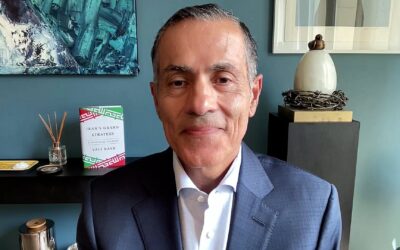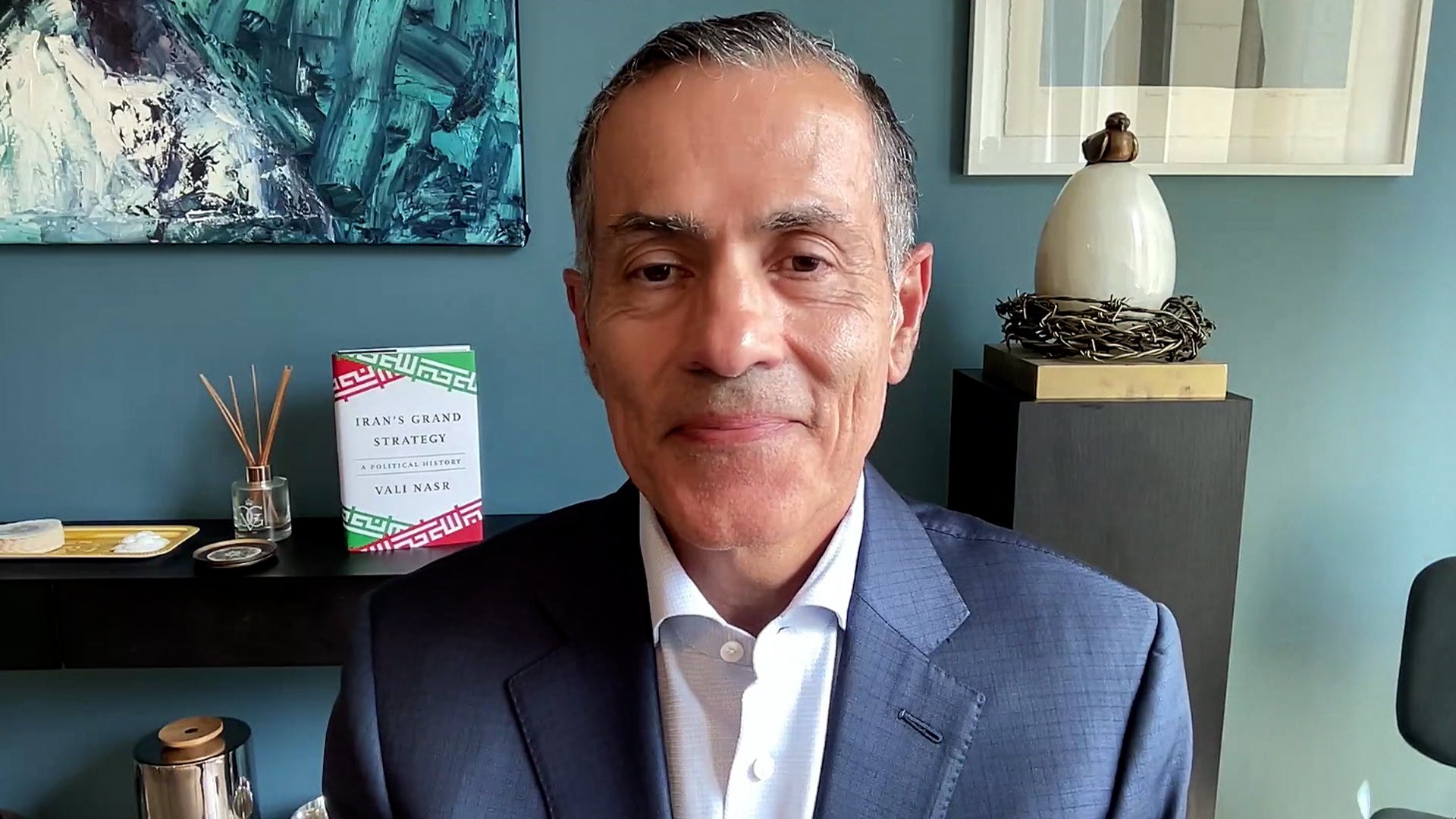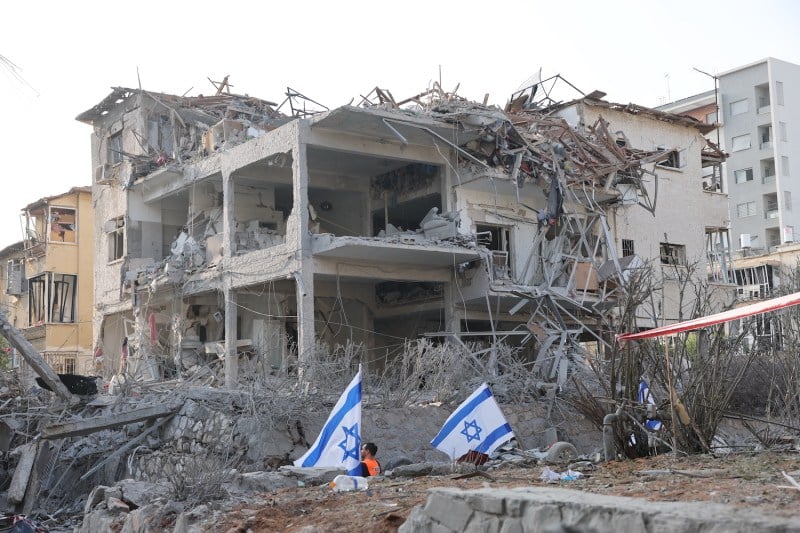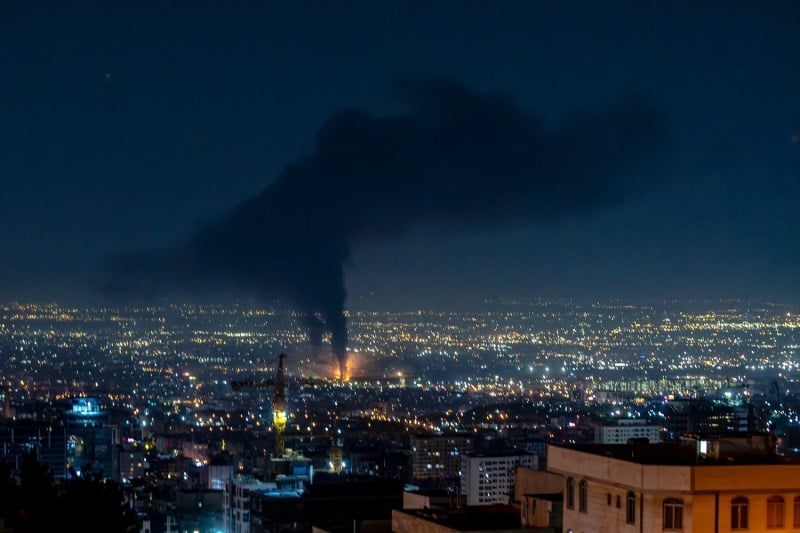Ukraine’s Zelensky Denounces U.S.-Russia Talks in Riyadh

Ukraine’s Zelensky Denounces U.S.-Russia Talks in Riyadh
Kyiv refuses to accept any outcome from this week’s talks.
U.S. Secretary of State Marco Rubio (seated, second from left) meets with Saudi Foreign Minister Prince Faisal bin Farhan Al Saud (seated, back left), Russian Foreign Minister Sergey Lavrov (seated, farthest right), and other officials to discuss the Russia-Ukraine war, seen at Riyadh’s Diriyah Palace in Saudi Arabia on Feb. 18. Evelyn Hockstein/AFP via Getty Images
Top U.S. and Russian officials convened in the Saudi capital of Riyadh on Tuesday to discuss improving bilateral relations and negotiating an end to the war in Ukraine. The four-and-a-half-hour meeting marked the most extensive contact between the two adversaries since Moscow’s full-scale invasion of Ukraine began in 2022, and it signified a stark departure from a U.S. foreign policy that has, until now, sought to isolate the Kremlin on the world stage.
Notably, no Ukrainian representatives were present in Riyadh. Ukrainian President Volodymyr Zelensky said on Tuesday that Kyiv would not accept any outcome from this week’s talks since Ukraine was not invited to attend. Zelensky also postponed his planned trip to Saudi Arabia tomorrow until next month to avoid giving the U.S.-Russia talks “legitimacy,” unnamed sources familiar with the matter told Reuters.
Top U.S. and Russian officials convened in the Saudi capital of Riyadh on Tuesday to discuss improving bilateral relations and negotiating an end to the war in Ukraine. The four-and-a-half-hour meeting marked the most extensive contact between the two adversaries since Moscow’s full-scale invasion of Ukraine began in 2022, and it signified a stark departure from a U.S. foreign policy that has, until now, sought to isolate the Kremlin on the world stage.
Notably, no Ukrainian representatives were present in Riyadh. Ukrainian President Volodymyr Zelensky said on Tuesday that Kyiv would not accept any outcome from this week’s talks since Ukraine was not invited to attend. Zelensky also postponed his planned trip to Saudi Arabia tomorrow until next month to avoid giving the U.S.-Russia talks “legitimacy,” unnamed sources familiar with the matter told Reuters.
Kyiv’s allies have expressed concern that they, too, are being sidelined. “There will be no peace in Ukraine without Ukraine or Europe,” Estonian Defense Minister Hanno Pevkur told Foreign Policy on the sidelines of the Munich Security Conference this weekend.
Rubio tried to assuage these fears on Tuesday, saying, “The European Union is going to have to be at the table at some point because they have sanctions as well that have been imposed,” referring to penalties on Russia. However, Rubio and U.S. National Security Advisor Mike Waltz have indicated that Washington will consult with Kyiv and Brussels but negotiate directly with Moscow.
Russian officials, led by Foreign Minister Sergey Lavrov, said they would not tolerate Kyiv joining NATO and demanded that the alliance disavow a promise made at the 2008 Bucharest summit that Ukraine could join the bloc at a future, unspecified date. Moscow’s delegation also said Russia would not accept the deployment of European or NATO troops to Ukraine, including as peacekeepers.
This post is part of FP’s ongoing coverage of the Trump administration. Follow along here.
Alexandra Sharp is the World Brief writer at Foreign Policy. X: @AlexandraSSharp
More from Foreign Policy
-

A security guard stands at the entrance to the U.S. Agency for International Development (USAID) headquarters on Feb. 3. DOGE Is Hacking America
The U.S. government has experienced what may be the most consequential security breach in its history.
-

A man with a beard in a suit and tie speaks behind a teleprompter. The logo for MSC is behind him. Vance Leaves Europe Gobsmacked
U.S. Vice President J.D. Vance delivered a rebuke on immigration and alleged censorship to a shocked Munich Security Conference.
-

A Palestinian girl carries a child through the rubble of houses destroyed by Israeli bombardment in Gaza City on March 3, 2024. Why Is the World So Polarized on Gaza?
The answer might be linked to race and colonization, explains author Pankaj Mishra, speaking on FP Live.
-

An attendee dressed like Uncle Sam waits for Donald Trump to arrive for a campaign rally at the Mosack Group warehouse on September 25, 2024 in Mint Hill, North Carolina. America Is Its Own Worst Enemy
It’s not unprecedented for a powerful country to simply shoot itself in the foot.









Join the Conversation
Commenting on this and other recent articles is just one benefit of a Foreign Policy subscription.
Already a subscriber?
.
Subscribe
Subscribe
View Comments
Join the Conversation
Join the conversation on this and other recent Foreign Policy articles when you subscribe now.
Subscribe
Subscribe
Not your account?
View Comments
Join the Conversation
Please follow our comment guidelines, stay on topic, and be civil, courteous, and respectful of others’ beliefs.
Change your username |
Log out
Change your username:
CANCEL
Confirm your username to get started.
The default username below has been generated using the first name and last initial on your FP subscriber account. Usernames may be updated at any time and must not contain inappropriate or offensive language.